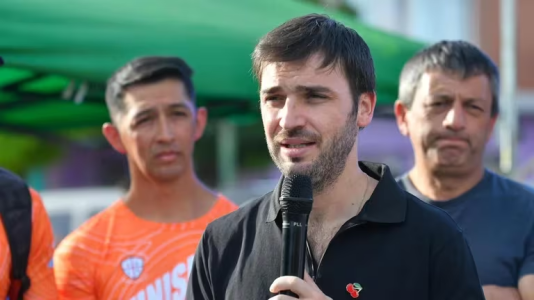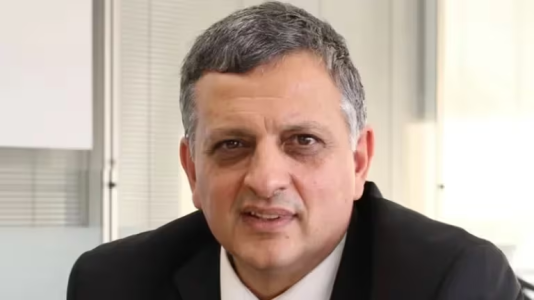The conflict between the governors with the Casa Rosada broke out the agreement between Milei and the PRO: Macri detaches himself from the Government - Infobae

Source:

El conflicto entre los gobernadores con la Casa Rosada estalló el acuerdo entre Milei y el PRO: Macri se despega del Gobierno
Cerca del expresidente sospechan que Milei se mueve para dividir al PRO. La tensión se da días previos a la reunión de Macri y el Jefe de Estado. La disputa del Balcarce 50 con las provincias traba un mega proyecto de YPF para acelerar la explotación de Vaca Muerta y potenciar el ingresos de...
February 25, 2024
Close to the former president they suspect that Milei is moving to divide the PRO. The tension occurs days before the meeting between Macri and the Head of State. The Balcarce 50 dispute with the provinces hinders a YPF mega project to accelerate the exploitation of Vaca Muerta and boost dollar income to the country
By Robertino Sanchez Flecha

The conflict between the governors with the Casa Rosada broke out the agreement between Javier Milei and the PRO: Mauricio Macri detaches himself from the Government Patricia Bullrich works for convergence
"Tell Milei and Francos that if they don't send the transportation money, a barrel of oil won't come out," Ignacio “Nacho” Torres warned an interlocutor from the national government who visited him in his province. The governor of Chubut is angry and makes it known in public and private. He is one of the leaders who expressed his support for the libertarian administration from the beginning, but expressed his character when the Casa Rosada cut trust funds that financed works and public policies in the provinces. The notice became a concrete fact on Friday, when the Chubut native noticed that Balcarce 50 had withheld $13.8 billion from the co-participation . He grabbed the phone, contacted his Patagonian peers and they signed a statement as the kickoff to a conflict that involves 23 provinces against the central State.
Chubut alleges that these funds were “illegally” retained. The same adjective applies to characterize Milei's decision to eliminate the Compensation Fund that subsidized public transportation rates in the interior. The Government adopted the same strategy to counter attack Torres' attitude. Guillermo Francos , Minister of the Interior of the Nation, stated in media interviews that the governor's warning about paralyzing oil and gas extraction was “illegal.”
Through a text published by the Office of the President, the Government assured that the decision to withhold the $13.8 billion was due to a debt that the southern province had with the national Executive for the Trust Fund for Provincial Development. And he points out Torres for applying a “Chavista threat.” Minutes later, all the governors, except Osvaldo Jaldo from Tucumán , supported their counterpart from Chubut. The support crossed the ancient crack and reached from the Kirchnerists Axel Kicillof and Gildo Insfrán to Jorge Macri and Alfredo Cornejo , emblems of what was Together for Change.

Nacho Torres, governor of Chubut, warned that he will cut off the oil supply if the national government does not send him the co-participation funds.
Governing is more complex than winning an election. During a campaign, verbal barbs are part of proselytizing folklore. In the exercise of the Presidency, incorrect political action or confrontation with the opposition can lead to decisional paralysis of a Government. Nobody imagined before December 10 that Milei would be facing Congress, all the governors, culture and the artistic world . And the Judiciary? The Supreme Court of Justice took advantage of the summer judicial fair period to let political water flow. The demands of the provinces and multiple actors of civil society accumulate at that time in the palace of the highest court. In this scenario, a ruling by the courtiers against any of the measures implemented by the Government could be lethal at the institutional level. But it hasn't happened yet.
Despite constantly stressing the dialogue with the governors, even the dialogueists, in the provinces they evaluate that there are still bridges to interact with the Casa Rosada and rebuild. “You broke that we are going to compose later,” he told Milei before assuming a leader who frequents him. The paradoxical thing is that in that confrontation Milei also clashed with the PRO, who seemed to be his main political partner . In Mauricio Macri's circle there is confusion over the President's attitude and they suspect that the libertarians' intention is to divide the party . They analyze that the Head of State seeks to establish himself as the leader of a right-wing front and needs to grind the former president so as not to have shadows.
That reading that wanders in the circles of the PRO maintains that Milei intends to dissect the PRO through Patricia Bullrich . The Minister of Security is bidding for these hours to prevent Macri from hegemonizing her party. He accepted that the former president leads the space, but he pulls strings to occupy decisive positions: a group of leaders who respond to him try to establish that Bullrich should be the president of the party Assembly, the body with less notoriety than the Council, but which has the pen to sign electoral alliances in the given years.
It is an ongoing discussion whose resolution will be known on March 19, the date on which the PRO must present to Justice the list of candidates to renew the party authorities. The fight over the management of the party is directly related to the possible alliance with La Libertad Avanza: Bullrich wants to maintain influence so that the PRO converges with the libertarians. Macri intends to assume leadership so that the party he founded strengthens its identity and is not absorbed by the Government.

Mauricio Macri prepares to preside over the PRO (EFE/ Juan Ignacio Roncoroni)
That is what the former president assures each leader who visits him in his offices in Vicente López. This was made known to each of the party governors, as well as to Torres himself and Rogelio Frigerio, from Entre Ríos, who went to see him on Thursday. It was in that conclave in which the situation in Chubut was also discussed.
Torres told Macri about the situation, he had done the same thing before with Bullrich, he asked him for support and informed him of the decision to confront Milei if they did not send him the corresponding funds for his province. The former president expressed his support and moved his chips to mediate with Executive officials. He was unsuccessful, as he almost always advises Milei. “The President listens to Mauricio, a lot and attentively, but he does not pay attention to him,” a PRO political operator who speaks daily with Macri revealed to Infobae .
This tension set off alarms in Macri, days before a face-to-face meeting with Milei. The two are expected to meet this week, upon the Head of State's return from his trip to the United States. While the two talk on the phone weekly, they haven't seen each other in person since December. The summit, which is ruled out will be extremely secretive, will enable a political hermeneutics on the tactical relationship between the PRO and the libertarians.

The Patagonian governors met yesterday afternoon to support Nacho Torres, from Chubut, and design a strategy to stop the decision of the Milei Government that affects funds that were going to the provinces
At this time, a political agreement between the two spaces is a utopia that is impossible to achieve. After the fall of the Omnibus Law and with Milei's escalation against governors and mayors, including those of the PRO, the Macri administration begins to distrust the President and choose to maintain equidistance. It is something that the bullrichistas, who act as official supporters, reject.
Due to the rejection of Milei, even Horacio Rodríguez Larreta let his intimates know that he will support Macri, despite their fights and differences, to be the driver of the PRO. The former head of the City Government does not plan to leave the party, except for a sealed pact with the libertarians: he knows that the former president will avoid that merger today.
The Patagonian governors met yesterday afternoon to support Nacho Torres, from Chubut, and design a strategy to stop the decision of the Milei Government that affects funds that were going to the provinces
At this time, a political agreement between the two spaces is a utopia that is impossible to achieve. After the fall of the Omnibus Law and with Milei's escalation against governors and mayors, including those of the PRO, the Macri administration begins to distrust the President and choose to maintain equidistance. It is something that the bullrichistas, who act as official supporters, reject.
Due to the rejection of Milei, even Horacio Rodríguez Larreta let his intimates know that he will support Macri, despite their fights and differences, to be the driver of the PRO. The former head of the City Government does not plan to leave the party, except for a sealed pact with the libertarians: he knows that the former president will avoid that merger today.

Horacio Marín, President and CEO of YPF, designs a plan to concentrate the national oil company's investment in Vaca Muerta
Milei's fight with the governors puts YPF on alert
The governors continue to be at war with Milei. Behind the legal discussions looms a political dispute over the tax collection funds that are concentrated and distributed by the central State. Yesterday afternoon, Torres met with the Patagonian leaders on Zoom. Alberto Weretilnek (Río Negro), Sergio Ziliotto (La Pampa), Rolando Figueroa (Neuquén), and Gustavo Melella (Tierra del Fuego) participated. Provincial chiefs agreed to cut oil supplies if the Government does not send the funds it cut.Behind this tension lies a sensitive point that worries the Government. YPF is working on a project to revert mature fields with the aim of concentrating all efforts and investment in the exploitation of unconventional wells, centered on Vaca Muerta. Horacio Marín, CEO and president of the company, knows the strategy perfectly because he led the Tecpetrol project, Techint's hydrocarbon wing, in Fortín de Piedra, Añelo. He is now promoting this initiative with the objective that Argentina raises close to U$D 20 billion a year in shale exports and the oil industry positions itself on a par with agriculture as the main generator of foreign currency.
This decision implies agreements with the provinces, which are the owners of natural resources by constitutional rule. It was precisely Marín who Torres told last week, when the engineer visited Chubut, that he will not support this measure if the Nation does not send him the co-participating funds. Not only that, but he warned him to block the oil supply if Milei or Francos did not reverse the situation.

Vaca Muerta, the heart of the plan that YPF intends to execute to boost its profitability (REUTERS/Agustin Marcarian)
Marín does not carry out a political task, but he knows that behind his role there are interests that mobilize the leadership and the private sector. The head of YPF visited Santa Cruz on Friday and brought the same proposal to Governor Claudio Vidal as he did to Torres. He had already done it before with Figueroa, from Neuquén, seeking to add support for his plan.
At the flag oil company they evaluate that conventional crude oil still has a profit, although they analyze the profitability of it will be enhanced if they concentrate their efforts on the shale blocks . This implies disinvesting in mature fields, a decision that affects the provinces that contain conventional hydrocarbons. “Now YPF wants to leave the province,” the governor of Chubut bellowed in a television interview on Friday, alluding to Marín's plan.
In the midst of a dispute with the Casa Rosada, Torres is seeking consensus among his Patagonian peers and the rest of the oil-producing provinces to execute a counteroffensive that hinders YPF's plan. They will only evaluate supporting the national oil company's initiative if the Government reverses the cut in funds to the provinces. The rest of the JxC governors will apply the same political attitude at the fiscal level in the event that Milei does not reopen a dialogue table.
Milei is heading to the speech before the Legislative Assembly on March 1 without support from Congress, the governors and, without oil? Question that will be cleared up in the coming days. The response may be an escalation of the crisis or the path towards consensus.

